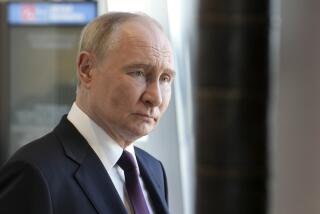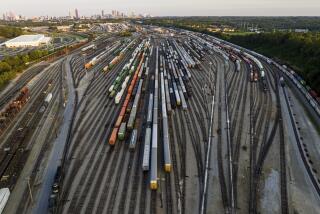Gorbachev Warns Strikers Could Force a Crackdown : ‘This Is Not the Road,’ He Declares
- Share via
MOSCOW — President Mikhail S. Gorbachev warned today that a threatened spillover of coal strikes to Soviet railroads could have “very far-reaching economic, social and political consequences” and force the Kremlin to consider new ways “to prevent the situation from getting out of hand.”
His unscheduled remarks before the Soviet Parliament constituted the most ominous official reaction since the current labor unrest began in Siberia’s Kuznetsk coal basin 10 days ago. It was seen here as a signal of growing government alarm over what were initially depicted as justifiable protests.
Referring twice to previously unreported calls for the nation’s railroad workers to join the coal strike starting Aug. 1, Gorbachev stated: “We must declare this with full responsibility before the entire people--we must tell them: ‘This is not the road! This is the wrong way!’ ”
“It seems to me that we must keep a cool head but not rest complacent or inactive” in face of the rail threat, Gorbachev said.
Could Cripple Country
Given the Soviet Union’s vast distances and underdeveloped highway system, railroads are an extraordinarily vital economic link, carrying about 80% of all the nation’s freight and the great bulk of its inter-city travelers. A widespread rail strike could quickly cripple the country.
Meanwhile, government efforts to appease the striking coal miners are apparently having mixed results.
Soviet television reported today that about 24,000 Siberian miners had gone back to work after being urged by strike committee leaders to accept pledges of higher pay, improved food supplies and greater financial autonomy for their collieries. However, it added, 150,000 others remained on strike.
A related strike in the crucial Donetsk coal basin of the Ukraine is apparently still growing. The walkout, which began over the weekend at eight mines, had by today closed 70 of the region’s 120 collieries, according to the television news.
Contrasting Reactions
A special, high-level government commission has been negotiating with the Siberian miners, and Gorbachev revealed today that he had sent a telegram Tuesday night before promising Donetsk miners equal treatment. However, the Soviet leader acknowledged, “I understand from the information I got this morning that there are still differences” between the sides.
The somber tone of Gorbachev’s remarks contrasted sharply with the initial reaction of the authorities to the Siberian strikes. Nikolai N. Slyunkov, a member of the Communist Party’s ruling Politburo sent to the Kuznetsk basin to deal with the situation, quickly capitulated to several of the strikers demands and even praised the miners for their “high civic consciousness.”
The strikers were seen as having responded to Gorbachev’s call for pressure from below to implement his program of reforms, known as perestroika. The miners call for greater local autonomy appeared to mesh with Gorbachev’s efforts to decentralize the system.
While the reformers may have quietly welcomed the strike wave at first, however, “I think in the last 36 hours they have become somewhat more alarmed as this has spread” from Siberia to the European part of the country, a Western analyst said.
More to Read
Sign up for Essential California
The most important California stories and recommendations in your inbox every morning.
You may occasionally receive promotional content from the Los Angeles Times.













